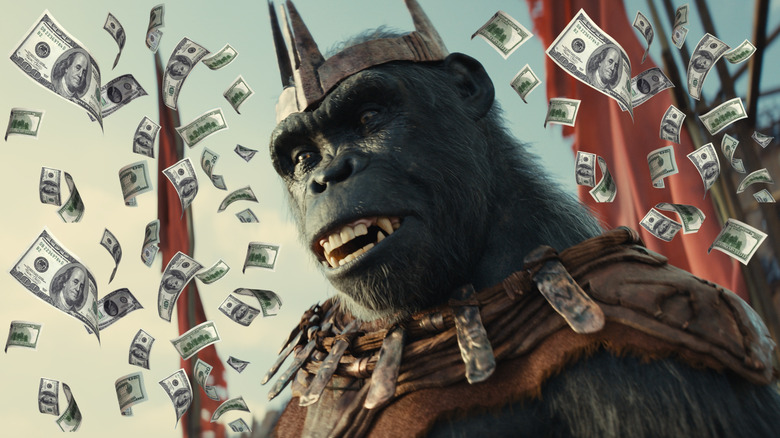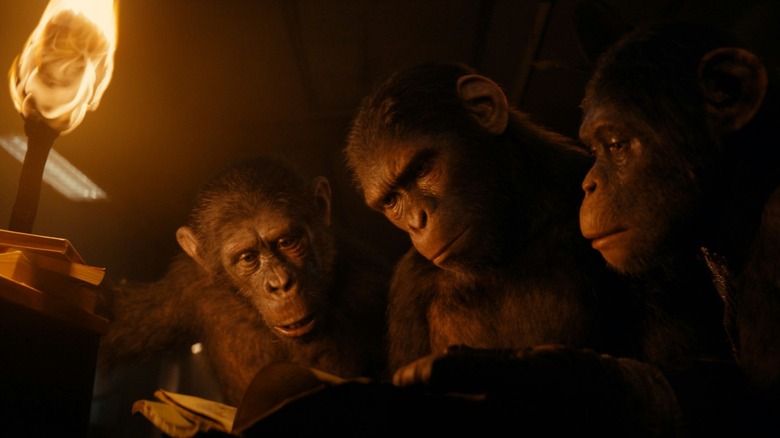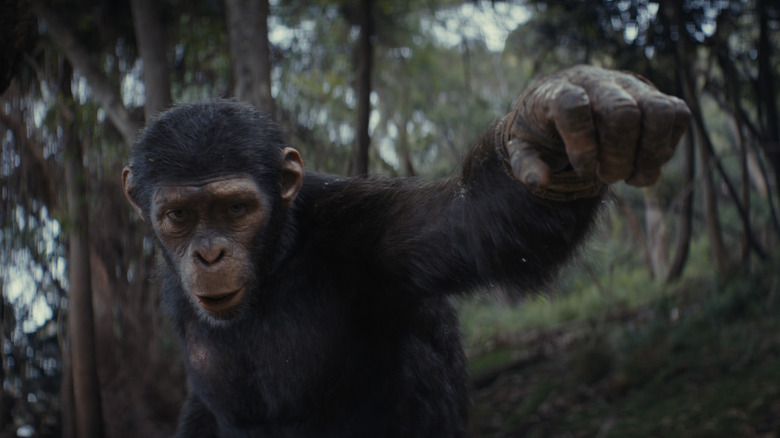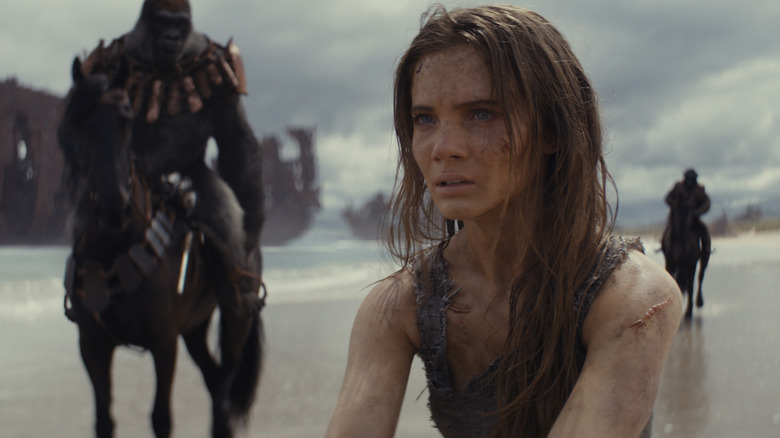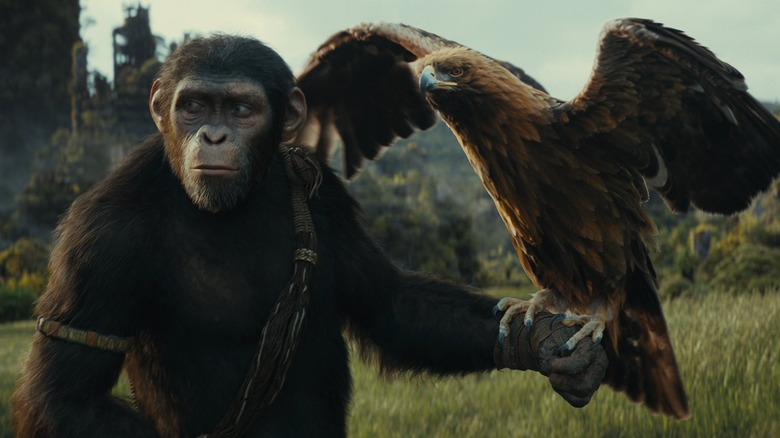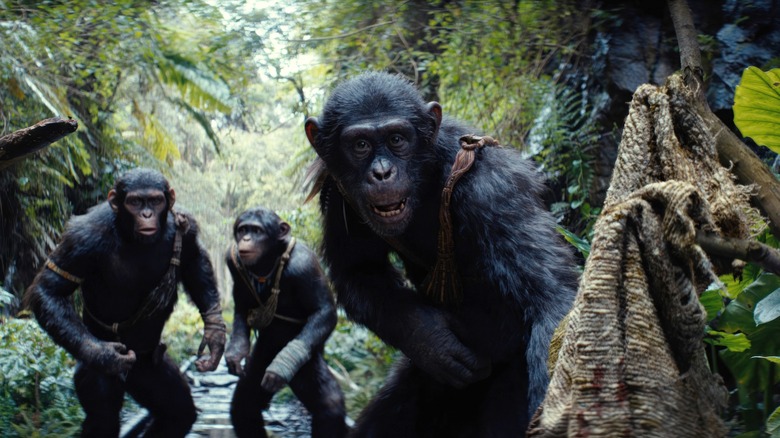5 Reasons Kingdom Of The Planet Of The Apes Conquered The Box Office
In a much-needed bit of good news for the box office in 2024, "Kingdom of the Planet of the Apes" had a very solid opening weekend. Hailing from Disney's 20th Century Studios, the latest entry in the long-running sci-fi franchise opened to $58.5 million domestically. That figure is $2 million above the $56.5 million estimates that hit the boards on Sunday. That's good news, as it suggests word of mouth was strong out of Friday and Saturday screenings heading into Mother's Day.
Director Wes Ball's film took in an additional $72.7 million from overseas markets to date, giving it a $131.2 million global start. That is even higher than 2017's "War for the Planet of the Apes" ($130 million), meaning it's the best worldwide opening for the modern "Planet of the Apes" franchise. Now, it's still got a very long way to go to get anywhere near the outsized global total of 2014's "Dawn of the Planet of the Apes" ($710 million worldwide), but we're off to a very good start. As I argued recently, "Kingdom" is going to be able to rule the box office charts for much of May, so it should hold strong in the coming weeks. It can (and should) easily match 2011's "Rise of the Planet of the Apes" ($481 million worldwide) by the end of its run. Given its $160 million budget, that's a win.
So, what went right here? How did a sequel to a movie that came out seven years ago manage to maintain its audience, even after a pandemic? Following the movie's welcome success in the early days, we're going to go over the five biggest reasons that "Kingdom of the Planet of the Apes" conquered the box office in the early going. Let's get into it.
A lack of direct competition
First and foremost, Disney picked a near-perfect release date for this one. "Kingdom" wasn't facing any direct, major competition as Universal's "The Fall Guy" opened the prior weekend to kick off the summer on a disappointing note. It didn't hold well enough ($13.7 million second weekend, 50% drop) to get in the way of the new "Apes" finding its audience. That audience was sizable seven years ago when "War for the Planet of the Apes" hit theaters, and it remains sizable now.
The other important thing about the competition factor is the availability of premium format screens. "Kingdom" was able to benefit greatly from IMAX and other premium screens such as Dolby Cinema, which have become increasingly important to blockbuster films. To that end, this movie made 41% of its money from ticket sales in premium format auditoriums. Audiences have demonstrated again and again that they are willing to pay more for the right experience with the right movie, and it helps greatly when those screens are available for the right movie.
It's also no secret that the summer season — and 2024 overall — is (or was) off to a slow start at the box office. Moviegoers haven't had the chance to become fatigued by blockbusters yet. "Kingdom" didn't have to make as strong of a case to many ticket buyers, as this was the summer franchise event many had been waiting for. It wasn't merely the next in a long line of noisy blockbusters, which can often feel like the case once we get to the end of July and into early August.
Critical reception was on the movie's side
Not that it always helps (see again, "The Fall Guy"), but critics being on a movie's side certainly never hurts anything. Ball, taking over for Matt Reeves, managed to keep the positivity going as "Kingdom of the Planet of the Apes" was largely praised by critics, currently holding an 80% approval rating on Rotten Tomatoes. It's not as roundly praised as "Dawn" or "War," but it's in the same ballpark as "Rise," which kicked off this modern incarnation of the franchise. /Film's Witney Seibold called "Kingdom" the best of the new "Apes" movies in his review.
The film earned a so-so B CinemaScore, which was below the other entries in the franchise. That said, it seems very much like the people who enjoyed it really enjoyed it, with a smaller minority of that small sample size strongly disliking it, which dragged down the score. The fact that it came in $2 million above Sunday estimates speaks to that. Word of mouth appears strong, and Disney has every reason to be optimistic in this regard.
Planet of the Apes has a healthy global audience
One of the key things as it pertains to the "Planet of the Apes" franchise is that its global audience has grown over the years. Yes, these movies play well in North America, but both "Dawn" and "War" made around 70% of their money overseas. Granted, that included major hauls in China, and as we've seen in the pandemic era, most Hollywood movies don't play like they used to in that country. Even so, "Kingdom" posted a very healthy overseas number and still has some markets left to open in. This is a movie made for global audiences, and those moviegoers showed up.
"Kingdom of the Planet of the Apes" had the third-biggest global opening of 2024, with "Dune: Part Two" ($82.5 million domestic/$182.5 million worldwide) and "Godzilla x Kong: The New Empire" ($80 million domestic/$194 million worldwide) still sitting comfortably atop that list. With "Kingdom" still set to open in big countries such as Brazil in the coming weeks, it has room to grow. An eventual release in Japan will also help matters quite a bit as well. In the early going though, "Apes" is still a strong brand internationally.
The Caesar trilogy remains beloved
Not to be overlooked in this movie's success is the love that audiences have for the Caesar trilogy. Even though Andy Serkis didn't return as Caesar in "Kingdom," in no small part because it takes place hundreds of years after the events of "War" in the overall timeline, those movies loom large over the new film. People have a strong fondness for that trilogy that preceded what Ball did here, and that shouldn't be discounted. It's not a "Matrix" situation where people didn't much care for the sequels; the recent "Apes" trilogy arguably only got better with each entry. It left a good taste in nearly everyone's mouths. In short, it left them wanting more.
It also didn't hurt that Disney made it very easy to get caught up on the franchise. The "Planet of the Apes" movies have been available on Disney+ and Hulu, with the titles right on the homepage for people to find. So those who might have missed the movies several years back or just wanted to do a rewatch could do so with ease. That matters in the modern era of too many streaming services and too many places where movies can be, especially if different franchise installments wind up on different services. Luckily, that wasn't an issue here.
Kingdom of the Planet of the Apes wasn't just promising more of the same
Another key point that builds off the Caesar trilogy is that yes, "Kingdom of the Planet of the Apes" is very much a sequel to those movies. At the same time, from the beginning of the marketing campaign when the first concept art was released, it was clear that Wes Ball wasn't just going to repeat what Reeves had done. The film boasts similar, hugely impressive visual effects, but it's telling a new story with new characters in a new part of the franchise timeline that was previously unexplored. So even though it was offering audiences a new entry in a universe they were familiar with, it was also promising something new. We've seen some franchise fatigue in recent years, and "Kingdom" managed to skirt that by moving on from the past in important ways.
With any luck, this new potential trilogy can take a similar path as the previous trilogy. "Kingdom" absolutely sets the stage for a potentially weird follow-up, and that film now has the chance to become a breakout success like "Dawn of the Planet of the Apes" was in its day, if all goes very well. Here's hoping.
"Kingdom of the Planet of the Apes" is in theaters now.
